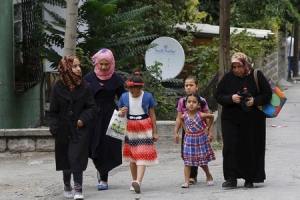Turkey is preparing for tens of thousands more refugees from Syria as government forces and Russian warplanes pound opposition-held areas, and officials said many would try illegally to get to Europe.
Syrian government troops and their allies, backed by Russian jets, launched an offensive against rebels battling to overthrow President Bashar al-Assad south of Aleppo, still home to two million people, a week ago.
Another offensive in Hama province, southwest of Aleppo, has also displaced tens of thousands, aid workers say. Estimates of the overall numbers on the move ranged between a U.N. refugee agency (UNHCR) figure of 30,000 to as many as 100,000.
Turkish government and aid agency officials said there was no sign yet of people from Aleppo and surrounding areas reaching Turkey in large numbers but that it was just a matter of time.
"We are preparing our teams for a new wave. We have mobile kitchens, food packaged," said Kerem Kinik, vice president of the Turkish Red Crescent.
The situation had worsened since Russia launched air strikes three weeks ago, he said.
"This affected the south and east part of Aleppo. Roughly 70-80,000 people moved from their houses and flats and now they are trying to find a secure place," he told Reuters.
President Tayyip Erdogan said on Thursday there were "strong indications" a new wave of migration was starting from Aleppo and renewed calls for a "safe zone" in Syria to protect civilians, an idea that has won little international backing.
Amin Awad, Middle East director for the U.N. refugee agency UNHCR, said Russian air strikes and increased fighting around Aleppo had contributed to the "dynamic of displacement", with about 30,000 displaced, but had not contributed much so far to the refugee exodus.
Kinik and a Western diplomat said that refugees may, however, be prevented from reaching the Turkish border, obstructed by fighting on the way.
So far, the UNCHR has not seen "significant movement" across borders due to the latest hostilities, UNHCR chief spokeswoman Melissa Fleming said.
HEADED FOR EUROPE
A senior government official said Turkey, which is a staunch opponent of Assad and has been incensed by Russia's intervention in support of him, has been expecting new refugee movements because Moscow's air strikes had targeted relatively stable parts of Syria where civilians were sheltering.
Both Kinik and the government official said many would try to smuggle themselves on to Europe, as Turkey and its European partners struggle to combat people-trafficking networks.
"Our worry is the changing profile of the refugees. Migrants who came to Turkey in the past had the hope of returning and saw Turkey as a temporary home," the official said, requesting anonymity because he is not authorized to speak to the media.
"Now it has become a transit location. The final destination is Europe...which is why steps must be taken to restore calm in Syria. There's little point trying to address the symptoms without solving the main problem."
Turkey is under pressure from the European Union, which it aspires to join, to do more to keep refugees on its soil and help stem the biggest migration movement the continent has seen since World War Two. The EU has proposed financial aid and faster membership for Turkey in the hope of winning its help.
But it is already sheltering more than 2.2 million refugees and while its wants more funding, Prime Minister Ahmet Davutoglu said on Monday Turkey should not be expected to turn itself into a "concentration camp" for refugees.
(This story has been corrected to fix UNHCR estimate for displaced people to 30,000 from 50,000 in paragraphs 3 and 9)
(Additional reporting by Tom Miles in Geneva; Editing by Nick Tattersall and Angus MacSwan)

















